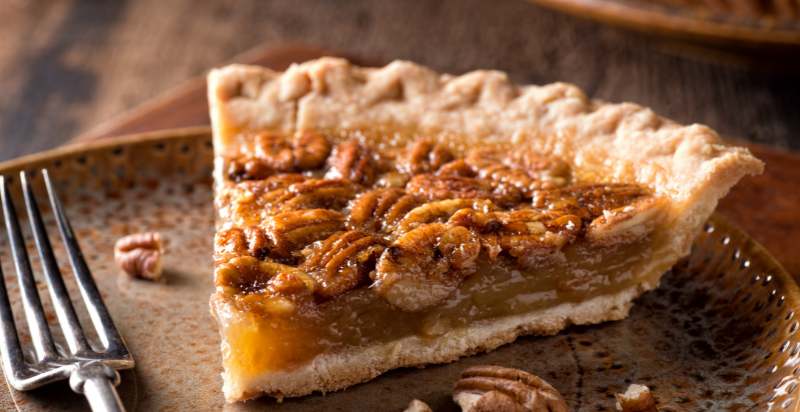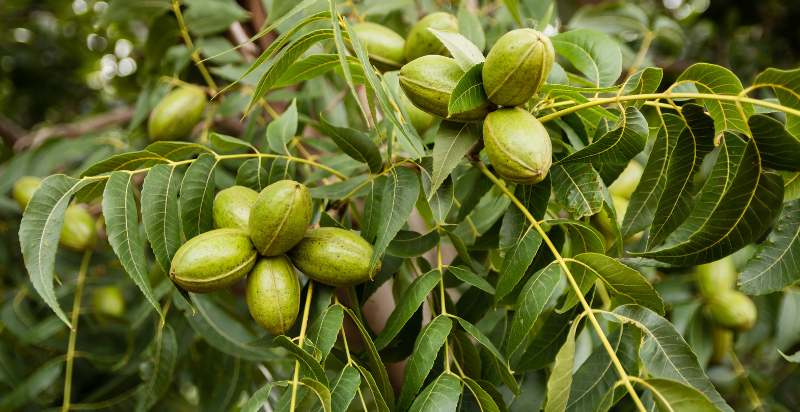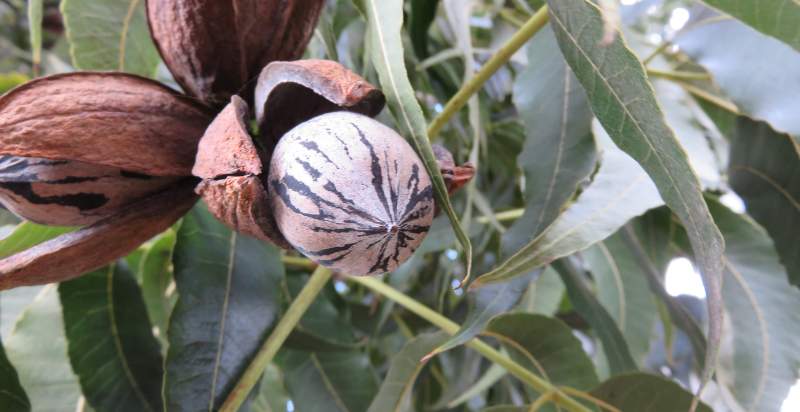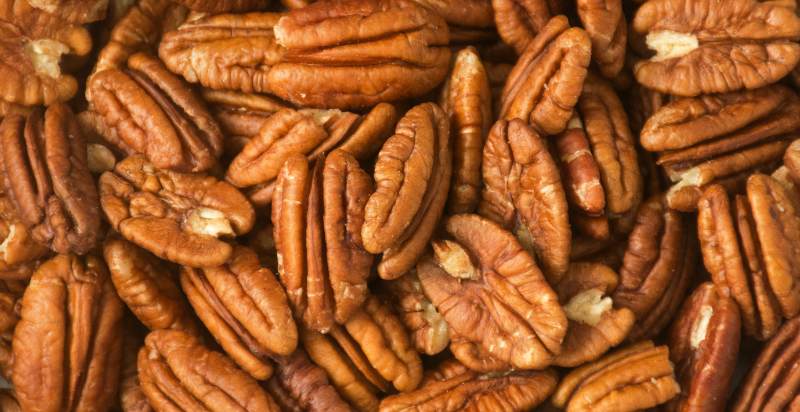Pecan is a nut native to North America and can be found in many parts of the world. The pecan tree grows best in well-drained, sandy soils and can reach heights of up to 100 feet. Pecans have a smooth, buttery texture and a sweet, nutty flavor. They are an excellent source of healthy fats, dietary fiber, antioxidants, minerals, vitamins, and other nutrients. Here’s everything you need to know about Pecans and how they can benefit your health.
What is Pecan?
Pecans are a type of tree nut, and the most popular variety is native to North America. The pecan trees can reach up to 100 feet tall and bear clusters of green oval nuts that have a smooth, buttery texture. Pecans have a sweet, nutty flavor and provide essential nutrients like healthy fats, dietary fiber, antioxidants, minerals, and vitamins.
History and Origin of Pecan:
Pecans are thought to have originated in North America, and the name “pecan” is derived from an Algonquian word meaning “nut that requires a stone to crack it open.” Native Americans cultivated pecan trees for centuries before being introduced to Europe by Spanish explorers in the 16th century. The first pecan trees were planted in Louisiana by French settlers in the 18th century, and today, most of the world’s pecans come from the United States.
Types of Pecans:
Pecans come in wide varieties, with some of the most popular being: Natives, Mammoths, Paper Shells, and Halves. Native pecans are smaller and sweeter than other varieties, while Mamoth pecans are larger and have a richer flavor. Paper Shells are thin-shelled and easy to crack open, while Halves have a sweet, nutty flavor that pairs well with desserts.
Nutritional Value of Pecan:
Pecans are an excellent source of healthy fats, dietary fiber, antioxidants, minerals, vitamins, and other nutrients. They contain high levels of monounsaturated fatty acids like oleic acid, which reduce inflammation and support cardiovascular health. Pecans are also a good source of essential minerals like magnesium, phosphorus, zinc, and vitamins A and E.
Health Benefits of Pecan:
Pecans are an excellent source of dietary fiber which helps to support digestive health. They also contain healthy fats like monounsaturated fatty acids (MUFA) and polyunsaturated fatty acids (PUFA), which can help lower cholesterol levels.
Pecans are also rich in various antioxidants, including vitamin E, beta-carotene, and selenium which can help protect cells from damage. Furthermore, pecans contain high minerals like magnesium, phosphorus, potassium, and zinc. These nutrients are essential for maintaining bone health, immune function, and blood pressure levels.
Uses of Pecans:
Pecans are versatile nuts and can be used in many different ways. They can be eaten as a snack, added to sweet or savory dishes, processed into flour, oils, and butter, or pressed for juice. Pecans can be toasted and added to salads, pasta, and cereals for extra crunch. They can also be chopped to top desserts such as ice cream, applesauce, or banana bread.
They make a great addition to oatmeal or granola bars. Pecan flour can replace regular flour for baking recipes and adds flavor and nutrition to bread, muffins, cookies, pancakes, waffles, and other baked goods. Pecan oil is often used in salad dressings or marinades. And finally, pecan butter makes a delicious spread on toast or as an ingredient in smoothies. There are so many ways to enjoy the unique flavor of pecans!
Pecans are also very nutritious and provide numerous health benefits when eaten in moderation. It is rich in vitamin E, magnesium, zinc, and essential fatty acids. It is also a great source of antioxidants which reduce inflammation and help fight free radicals. Pecans have been linked to improved heart health due to their monounsaturated fats and other nutrients. Eating pecans can also help control blood sugar levels and improve digestion as they are high in dietary fiber.
So go ahead and enjoy the many uses of pecans! Whether you’re snacking on them raw or adding them to your favorite recipes, you’ll love this nutritious nut.

How to Plant Pecan ?
Pecans are a type of nut that is native to North America. Planting pecans can be a rewarding experience as they can produce abundant nuts for many years when planted and cared for properly. This guide will give you all the information you need to plant and grow your pecan tree successfully.
Where to Plant Pecan:
When choosing a location for your pecan tree, it is important to consider several factors, such as sun exposure, soil type, drainage, and available space. Pecans prefer full sun or partial shade and well-drained soil with a pH between 6.0 and 7.5. You’ll also want to ensure enough room for your pecan tree to grow.
When to Plant Pecan:
The best time to plant a pecan tree is early spring when soil temperatures are consistently above 65 degrees Fahrenheit. It is important to plant early enough in the season, as this can result in transplant shock and poor root development.
How to Plant Pecan:
Once you have chosen a suitable location for your pecan tree, it’s time to plant! You will need a shovel or spade, some compost or manure, and some mulch. Start by digging a hole that’s about twice as deep and as wide as your pecan tree’s root ball. Make sure the bottom of the hole is level.
Add some compost or manure to the bottom of the hole and mix it into the surrounding soil. This will provide your tree with nutrients as it starts to grow. Place your pecan tree in the center of the hole and backfill it with soil. Once you’ve filled the hole, use a hose to water it thoroughly. Finally, spread a layer of mulch around the base of your pecan tree to help retain moisture and suppress weeds.
Caring for Your Pecan Tree:
Once planted, there are several steps you can take to ensure that your pecan tree remains healthy and produces abundant nuts each year. Watering is essential; mature trees should be watered every 10-14 days during dry spells. It would be best if you also fertilized your tree three times yearly; this will help ensure it gets the nutrients it needs to produce healthy nuts. Finally, keep an eye out for any signs of pests or diseases and take appropriate action if necessary.
Harvesting Pecan Nuts:
Pecans generally take about 3 to 4 years to produce a full crop, but once they begin producing fruits, you can expect an abundant harvest each season. It is best to wait until the nut husks have turned brown before attempting to harvest the pecans from the tree. Harvesting can be done by hand or with a tool known as a nutcracker. Once the nuts have been harvested, you can store them in an airtight container to enjoy throughout the year.
Planting and growing a pecan tree is a rewarding experience that can provide you with a source of delicious nut harvests for years to come. Your pecan tree will thrive and produce abundant crops each season with proper care and attention. Follow the steps outlined in this guide to get your pecan tree off to a successful start!
How to Care for and Grow Pecan?
Pecan trees are relatively easy to care for as long as you understand their basic needs. The key to success when growing pecans is keeping them well-watered, fertilized, and free from pests.
Good soil drainage is essential for pecan tree health. Before planting a pecan tree in your yard, it’s important to ensure the soil is well-drained and doesn’t contain standing water or heavy clay. Planting on mounds helps ensure good drainage.
Once planted, keep the soil moist but not soggy by providing regular irrigation during the hot summer. Pecans also require generous amounts of nitrogen, phosphorus, and potassium fertilizer each year for optimal growth and production.
Insects, diseases, and other pests can be a problem for pecan trees. Inspect your tree often and take steps to identify and treat any problems quickly with the help of an arborist or pest control specialist if needed. Early detection is key in keeping your tree healthy.
Finally, proper pruning is important for overall health as well as the production of nuts. Prune away any dead, diseased, or damaged branches from your pecan tree annually to focus its energy on new growth and nut production.
These simple guidelines will help ensure you have a healthy, productive pecan tree for many years!

Preventions from Pests and Diseases of Pecan:
It is important to practice proper orchard management to prevent pests and diseases from affecting Pecan trees. It is essential to maintain tree health by practicing cultural practices such as proper pruning, fertilization, mulching, and irrigation. Regular monitoring should be done for signs of pest infestations and disease outbreaks. If pests and diseases are found, appropriate treatments should be applied in time. Some preventive measures that can be taken include:
- Selecting resistant cultivars: Choosing resistant varieties of Pecan trees helps reduce the risk of pest infestations and disease infections.
- Planting in well-drained soils: Planting trees helps reduce the risk of pests and diseases.
- Applying fungicides: Fungicides help control fungal diseases of Pecan trees.
- Implementing Integrated Pest Management (IPM): IPM involves using various methods like biological controls, cultural practices, physical or mechanical controls, and chemicals to reduce pest populations.
- Sanitation: Regular sanitation helps prevent the buildup of disease-causing organisms in the orchard.
- Monitoring for pests and diseases: It is important to regularly monitor for signs of pest infestation and disease infection so that appropriate treatments can be applied in time.
- Avoid stressing the tree: Stressed trees are more susceptible to insect damage and disease infections. Hence it is important to maintain tree health by avoiding stress factors.
- Applying insecticides: Insecticides help control insect pests of Pecan trees.
- Planting trap crops: Trap crops can be planted near Pecan trees to attract pests away from the main tree.
- Crop rotation: Rotating with non-host crops helps reduce the risk of pest and disease buildup in the orchard.
- Ensuring good air circulation: Proper pruning and spacing between trees help ensure good air circulation, which reduces the risk of fungal diseases.
By following these preventive measures, it is possible to protect Pecan trees from pests and diseases. It is important to always monitor for signs of infestation or infection so that appropriate treatments can be applied in time. With proper management, a healthy harvest of nuts can be achieved every year.
How to Harvest Pecan?
When it comes to harvesting Pecan, timing is key. The best time for harvesting pecans is in late September or October when the nuts are mature and ready for harvest. Please pay close attention to the shells of the pecans, as they should be hard and full with a light-brown color.
Pecans can be harvested by hand or with a mechanical harvester. If you’re planning on harvesting by hand, wear gloves, as the shucks can cause irritating skin reactions. Start at one end of your Pecan tree and gently shake until the nuts fall off; then, gather them up into a bucket or bag. Using a mechanical harvester will expedite the harvesting process and gives you a more efficient way to gather the pecans.
Once the Pecan nuts have been harvested, you must dry them out to bring out their flavor. This can be done by laying the nuts on trays or racks and setting them outside in direct sunlight for at least two weeks. After they’ve had time to dry, they can be stored in airtight containers and enjoyed throughout the year!

How to Store Homegrown Pecan?
Storing homegrown pecans is easier than you think. After gathering and cleaning your pecans, there are several storage options to choose from.
For short-term storage, keep the nuts refrigerated in an airtight container for up to 3 months. For longer-term storage, place them in a cool (50 – 70°F), dry area away from direct sunlight for up to one year. If you want to store their flavor and freshness even longer, freeze them in an airtight container, lasting 2 or more years.
If you live in a humid climate, it is best to choose frozen storage over drying out the fruits, as they may become moldy and absorb too much moisture. If you want to dry out the fruits, tools like dehydrators and food processors can be used to do so.
However you store them, check on your pecans regularly for any signs of spoilage or decay. Depending on your area’s temperature and humidity levels, you may have to replace your containers more frequently than expected. Also, remember that frozen pecans will last longer but are not suitable for baking.
No matter which storage option you choose, homegrown pecans can easily be preserved and enjoyed for a long time! So go ahead and enjoy those delicious treats whenever you, please!

How to Use Pecan in your day-to-day life?
Pecan nuts are extremely versatile and can be used in various sweet and savory dishes. Here are some ideas on how to incorporate pecans into your day-to-day life:
- Add them to oatmeal or pancakes for a crunchy topping
- Use them in place of croutons on salads
- Make a pecan pie or other dessert
- Top off a main dish with pecans for added flavor and texture
- Make a batch of pecan butter to spread on toast or use as a dip
- Add them to savory dishes like stuffing or risotto
- Grind them up and use them as a coating for chicken or fish
- Bake muffins within them in the batter
- Make a pecan brittle to snack on
- Use them to make a crust for tarts or quiches
- Chop them and sprinkle them over yogurt, ice cream, or smoothies!
The possibilities are endless. With their sweet and nutty flavor, pecans can be used in all kinds of savory and sweet recipes. Give these ideas a try and enjoy the amazing taste of pecans.
Potential Risks from Pecan in your day-to-day life:
Pecan consumption can pose potential health risks for some individuals. For example, people with tree nut allergies may experience an allergic reaction upon eating pecans. Additionally, due to their high-fat content, consuming too many pecans could lead to unhealthy weight gain and increase the risk of developing heart disease or diabetes.
Eating large amounts of food can also cause digestive distress, including bloating and gas in some people. Before making pecan a regular diet, you must speak with your doctor about any potential risks associated with adding this food. It is best to consume them in moderation as part of a healthy and balanced diet.
Furthermore, unshelled pecans should be purchased from a reputable source and stored properly to avoid potential food-borne illnesses. With proper precautions, pecans can provide many health benefits while still being part of a healthy diet.
Conclusion:
Pecans are a delicious and nutritious snack that can be easily incorporated into your day-to-day life. They come in many forms, from raw to roasted, and provide a sweet yet nutty flavor that is perfect for adding to both savory and sweet dishes. While they pose potential health risks if consumed erroneously, they can be minimized by speaking with your doctor before adding them to your diet or following safe storage practices. With proper precautions, pecans can make a healthy addition to anyone’s lifestyle!
- Everything You Wanted to Know About Red Tamarillos - June 2, 2025
- A Guide to Tulips: Everything You Need to Know & More… - June 2, 2025
- Guanabana: Description, Flavor, Benefits, And Uses - May 27, 2025
